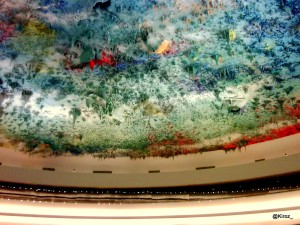
Photo by: Kirolos Nathan, CIHRS
Egyptian human rights defenders representing the Egyptian NGO Forum, a group of 23 independent Egyptian human rights organizations, have been present at the 22nd session of the United Nations Human Rights Council in Geneva throughout the last week with an urgent appeal.
“The human rights crises in Egypt must be urgently addressed by the United Nations,” stated Ziad Abdel Tawab, deputy director of the Cairo Institute for Human Rights Studies. “Just because we ousted Mubarak does not mean that the democratization process is finished – in reality, progress towards true democracy has stalled. Serious human rights violations continue to be committed with impunity, and civil society and the media are under unprecedented threat by the government. The country has merely traded one form of authoritarianism for another, albeit with some new features.”
Over the last eight months there have been serious concerns about the extent to which the state of human rights in Egypt has rapidly deteriorated under the leadership of President Mohamed Morsi. Some Egyptian human rights organizations have argued that in many ways, the state of human rights in the country currently appears even direr than it did prior to the revolution and the ouster of former president Hosni Mubarak.
According to members of the NGO Forum, serious human rights violations have become routine in post-revolutionary Egypt, with all segments of the population being affected. Violations of women’s rights and the right to freedom of assembly, association, and expression, as well as practices of arbitrary detention and torture continue to be carried out with impunity.
These representatives of the Egyptian NGO Forum and Egyptian civil society spoke at a UN side event on 11 March. The event included a discussion of the recent attacks against peaceful protestors in Egypt, which some have described as “circles of hell.”
“Women were forcibly removed from the crowds of demonstrators by circles of men who then attacked them with knives and blades, beat them, ripped their clothes off, and raped them. Extreme brutality was used in all cases, leaving at least two women in need of intensive medical care. In two instances, women were raped with a blade,” stated Massa Amir, a researcher at Nazra for Feminist Studies, referring to recent demonstrations in Egypt that were intended to highlight the anniversary of the uprising for democracy in the country.
“The total lack of political will demonstrated by the government to investigate these violations and prosecute perpetrators represents a serious breach to Egypt’s human rights obligations and constitutes a worrying trend for the future of women’s political participation and their involvement in shaping the new Egypt,” said Masa Amir.
While in Geneva, the delegation also addressed the proposed legislation on non-govermental organizations (NGOs) that is currently being discussed by the upper house of parliament. Such laws, if passed, would threaten the viability of independent civil society in Egypt by introducing a slew of unprecedented restrictions, including cutting off access to funding by human rights and development NGOs. “This legislation would constitute a flagrant violation to the right to freedom of association by forcing the majority of independent NGOs in Egypt to either severely cut their activities or to shut down altogether,” said Mohamed Zaree, Program Manager at the CIHRS and member of the NGO Forum’s delegation to Geneva.
Already, civil society organizations are being targeted by the government. In a letter sent to the Egyptian Organization for Human Rights, the Ministry of Insurance and Social Affairs referred to instructions issued by the Prime Minister that no “local entity” shall be permitted to engage with “international entities” in any way without the permission of the “security bodies”. These restrictions violate the numerous resolutions passed by the UN calling on states to allow for unhindered access of local civil society organizations to international human rights mechanisms.
The NGO Forum’s delegation further discussed how the right to peaceful protest and assembly is similarly threatened by a draft law currently being discussed in Egypt that employs overly vague language, including banning protests that would ‘block roads’ or ‘prevent people from going to work’. Such broad provisions have been easily manipulated by authorities to restrict assemblies that they do not want to see take place. In practice, Egyptians face major threats when exercising their right to free assembly. Lethal clashes have broken out following the organization of peaceful protests, as such as during the sit-in at the Ittihadiya Presidential Palace, when supporters of the ruling party clashed with demonstrators, leaving at least 11 people from both sides dead and hundreds injured.
Finally, the NGO Forum’s delegation addressed violations to freedom of expression in general, and media in particular, that are committed in Egypt. As Nihad Aboud, who joins the delegation on behalf of the Association for Freedom of Thought and Expression, points out, “The safety of reporters is nowadays in danger, more that it has ever been. Documented violations include detention, kidnapping, and even death, as with El Hosseiny Abou Deif in December 2012. Various complaints were submitted to the investigative authorities against journalists and other media professionals accusing them with insulting the president, publishing false news, and slander, due to their criticism of the policies of the ruling party. Other violations to media freedom have been committed under the false pretext of defamation of religion. The ruling party seems to be hoping that this will lead to a self-censorship of the media, as was the case under Mubarak.”
Mr. Tawab of CIHRS explains, “We came to Geneva to draw attention to the worsening situation in Egypt and to urge the United Nations Human Rights Council to call upon Egypt to uphold international rights standards and to respect and promote the human rights of Egyptians. Many citizens have and continue to struggle and even give their lives for freedom and democracy. They deserve recognition and protection from the UN Human Rights Council.”
Share this Post

